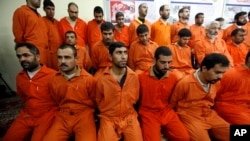More than two and a half years after the death of al-Qaida leader Osama bin Laden, American experts and counter-terrorism officials say his organization remains a major threat across the Middle East and North Africa.
That assessment comes as several recent news reports say U.S. lawmakers and American intelligence officials are expressing growing concerns over al-Qaida's expanding manpower, particularly in the Middle East and Africa.
James Mattis is no stranger to al-Qaida, having led the U.S. Marines in Iraq and later overseen U.S. military operations in the Middle East, Pakistan and Afghanistan as the general in charge of the United States Central Command.
Now retired, he remains anxious about the course of the struggle against al-Qaida.
“Violent jihad, al-Qaida in particular is growing in adherence right now. It is not shrinking," he said recently. "It is actually gaining ground and they are exploiting new opportunities"
Mattis spoke at a terrorism conference in Washington in December sponsored by the U.S.-based think tank the Jamestown Foundation. He said the West is failing to understand al-Qaida and as a result has not been able to fashion an effective operational and propaganda strategy to defeat the terror organization.
“Certainly our efforts to date have not been sufficient. We defend today more than a geographic realm; we defend a realm of ideas," Mattis said. "For us in the West they grew out of the Enlightenment and they have to do with freedom and the dignity of the individual and a whole lot of things like that.
"Since Tony Blair left office I don’t know that we have had any Western politician able to stand up and to explain the nobility of what we are trying to keep alive in terms of our civilization’s values,” he added.
Growing concerns
Mattis isn’t the only one dismayed by the resurgence in jihadist activity during 2013.
While many of Bin Laden's top lieutenants may now be dead, killed by U.S. Special Forces or in drone strikes, jihadist groups in Syria, Somalia, Yemen, Libya and West Africa were able to mount several major perorations over the past year.
In 2013, jihadists inspired by or linked to al-Qaida stormed a shopping mall in Kenya killing at least 72, invaded a natural gas facility in Algeria and executed 39 hostages.
Al-Qaida attacks are on the rise once again in Iraq. In Egypt’s Sinai desert, experts fear homegrown militant groups may be edging closer to a formal affiliation with al-Qaida.
And jihadists have emerged as the most powerful force in the ranks of rebels in Syria fighting to oust President Bashar al-Assad.
Influence in Syria
In northeast Syria, Giwan Ibrahim, a top Kurdish commander who has been battling al-Qaida affiliated fighters said jihadists are having success in worldwide recruiting. Many of the jihadists he battles aren’t Syrian-born.
“Ninety percent of them are from foreign countries. They are not from Syria: most of them from Saudi Arabia, Tunisia, Libya," he said. "I saw by my eyes people from European countries they were members of al-Qaida and fighting us.”
Ibrahim said it is hard to counter jihadists because of their psychology.
“He has got nothing in his mind apart from destruction and to go to heaven. That makes the mission for him easier than for us,” he said.




